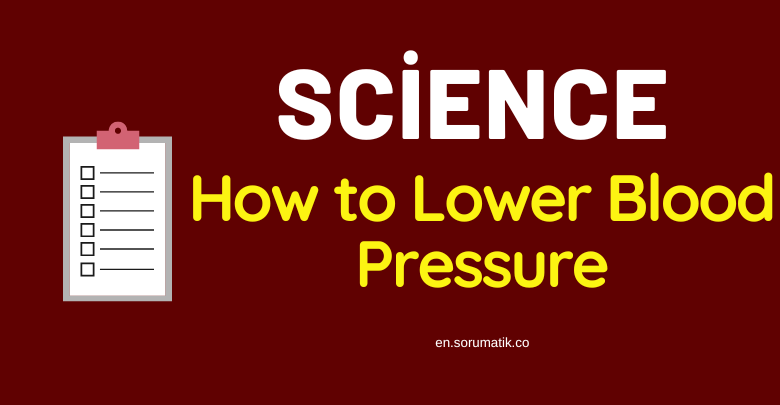High blood pressure, or hypertension, is a common health condition that affects millions of people worldwide. It’s often referred to as the “silent killer” because it typically doesn’t exhibit noticeable symptoms until it reaches a critical stage. In this article, we will explore the significance of managing blood pressure, effective ways to lower it, and answer some frequently asked questions regarding this crucial topic.
Understanding High Blood Pressure
What is blood pressure?
Blood pressure refers to the force exerted by the blood against the walls of your arteries as it flows through them. It consists of two measurements: systolic pressure (the force when the heart beats) and diastolic pressure (the force when the heart is at rest). A normal blood pressure reading is typically around 120/80 mm Hg.
Types of blood pressure
- Normal: Less than 120/80 mm Hg
- Elevated: 120-129/<80 mm Hg
- Hypertension Stage 1: 130-139/80-89 mm Hg
- Hypertension Stage 2: 140 or higher/90 or higher mm Hg
The Importance of Managing Blood Pressure
Maintaining healthy blood pressure is crucial because high blood pressure can lead to serious health problems, including heart disease, stroke, and kidney disease. Fortunately, there are various strategies you can implement to lower your blood pressure naturally.
Lifestyle Changes for Lowering Blood Pressure
Making specific lifestyle changes can significantly impact your blood pressure levels. These changes include:
Healthy diet
A diet rich in fruits, vegetables, whole grains, lean proteins, and low-fat dairy products can help lower blood pressure. Consider following the DASH (Dietary Approaches to Stop Hypertension) diet.
Regular exercise
Engaging in regular physical activity, such as brisk walking, swimming, or cycling, can help lower blood pressure and improve overall cardiovascular health.
Stress management
Stress can contribute to high blood pressure. Practicing relaxation techniques like meditation, deep breathing, and yoga can be effective in reducing stress.
Limiting alcohol intake
Excessive alcohol consumption can raise blood pressure. Limit your alcohol intake to moderate levels.
Quitting smoking
Smoking damages blood vessels and can lead to high blood pressure. Quitting smoking is essential for overall health.
Dietary Approaches to Lower Blood Pressure
Incorporating specific dietary approaches can have a positive impact on blood pressure:
DASH diet
The DASH diet emphasizes fruits, vegetables, whole grains, lean proteins, and low-fat dairy products while reducing sodium intake.
Sodium reduction
Reducing salt intake can help lower blood pressure. Opt for low-sodium alternatives and avoid processed foods high in salt.
Potassium-rich foods
Foods like bananas, oranges, and potatoes are rich in potassium, which can counterbalance the effects of sodium on blood pressure.
Magnesium intake
Magnesium-rich foods like nuts, seeds, and leafy greens can also help regulate blood pressure.
Physical Activity and Its Impact on Blood Pressure
Regular physical activity offers several benefits for blood pressure management:
Types of exercise
Aerobic activities, strength training, and flexibility exercises all contribute to improved blood pressure levels.
How exercise lowers blood pressure
Exercise helps your heart use oxygen more efficiently and can lower your resting heart rate, both of which contribute to lower blood pressure.
Stress Management Techniques
Effective stress management can lead to reduced blood pressure:
Meditation and mindfulness
Practicing mindfulness and meditation techniques can alleviate stress and positively impact blood pressure.
Deep breathing exercises
Deep breathing exercises can help calm the body’s stress response and lower blood pressure.
Yoga
Yoga combines physical postures, breathing exercises, and meditation to reduce stress and improve overall health.
Progressive Muscle Relaxation
This technique involves tensing and then relaxing muscle groups to reduce physical tension and stress.
Medications for Blood Pressure Management
In some cases, medication may be necessary to manage blood pressure. It’s essential to consult a healthcare professional who can determine the right treatment plan for your specific situation.
Monitoring Blood Pressure at Home
Regular monitoring of blood pressure is crucial. Home blood pressure monitors are widely available and easy to use, providing valuable data for managing your health.
The Role of Alcohol in Blood Pressure
While moderate alcohol consumption may have some cardiovascular benefits, excessive alcohol intake can lead to high blood pressure and other health issues. It’s essential to strike a balance.
Smoking and Its Impact on Blood Pressure
Smoking is a major risk factor for high blood pressure and heart disease. Quitting smoking is one of the most significant steps you can take to improve your overall health.
The Connection Between Sleep and Blood Pressure
Quality sleep is vital for overall health, including blood pressure regulation. Sleep disorders like sleep apnea can contribute to high blood pressure.
Frequently Asked Questions
-
Can high blood pressure be cured completely?
- High blood pressure can often be managed but not always completely cured. Lifestyle changes and medications can help control it.
-
What foods should I avoid to lower blood pressure?
- Limit your intake of high-sodium foods, processed foods, and foods high in saturated and trans fats.
-
How long does it take for lifestyle changes to lower blood pressure?
- Results vary, but many people see improvements within a few weeks to a few months.
-
Are there any natural remedies for lowering blood pressure?
- Yes, natural remedies include dietary changes, exercise, stress management, and adequate sleep.
-
Is high blood pressure hereditary?
- Genetics can play a role in high blood pressure, but lifestyle factors also significantly influence it.
Lowering and managing blood pressure is essential for overall health and well-being. By adopting a healthy lifestyle, making dietary changes, and seeking professional guidance when necessary, you can take control of your blood pressure and reduce the risk of associated health problems.
